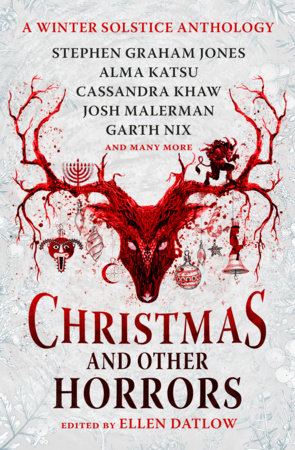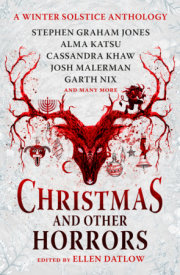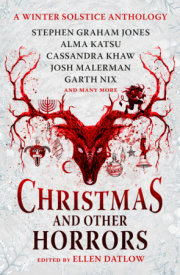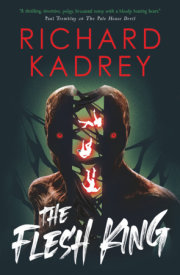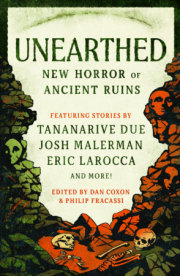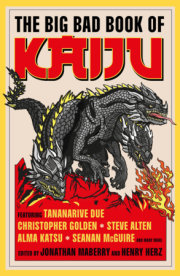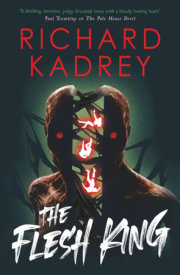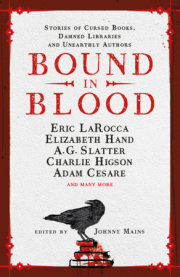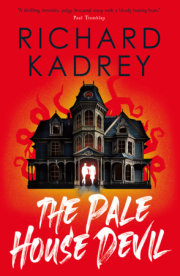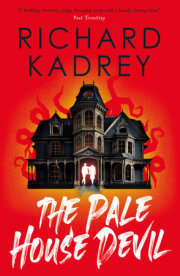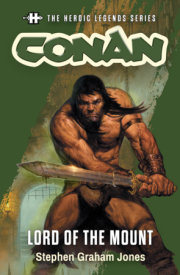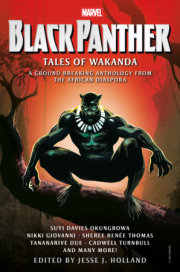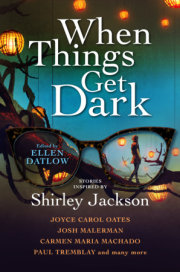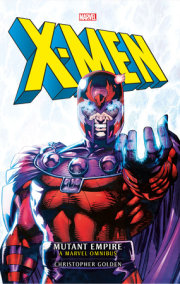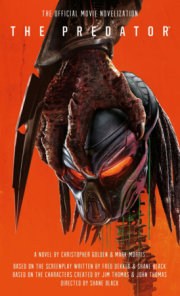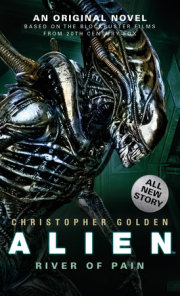THE IMPORTANCE OF A TIDY HOME
Christopher GoldenIF anyone had told Freddy he would one day be elbow deep in a garbage bin behind a third-rate restaurant in Salzburg, searching for a late dinner, he would have scoffed at them. Haughtily, of course, the way professors are meant to scoff. That had been his occupation—both vocation and avocation—until 1957, when addiction to morphine had led first to petty crimes and then to a psychiatric hospital. This was before Austria had begun to approach drug addiction as a problem requiring treatment instead of punishment, and so there had been a bit of time in prison as well.
Prison had helped.
Freddy knew that wasn’t the case for many who had been in his position, but for him, prison had been a time of clarity. Without drugs, without alcohol, without distraction. He had learned that the mania he had always experienced, the way his skull felt like a hive of agitated bees, could be survived. And if that meant he sometimes saw things that weren’t there, or said things that others interpreted as either a bit mad or wildly inappropriate, well, that was the eccentricity of a professor.
Of course, once he had been released, no one wanted him as a professor anymore. Or anything else, for that matter.
By that night, the fifth of January, 1973, he had been living without a home for nine years, during which time he had never diluted his brain with a single ounce of alcohol, nor the use of any illegal substance. But since the polite society of his city had finished with him, Freddy had finished with it. He lived in its parks and haunted its alleys, he accepted the offerings of strangers but never met their eyes, he forged a life from their castoffs, from food and clothing discarded and forgotten just as he had been.
The first time he saw the Schnabelperchten walking the streets in their black robes, with their gleaming shears and their enormous, bone-like beaks protruding from beneath their hoods, it did not surprise him that they passed him by. Their duties could not bring them to his doorstep, because of course he had none. No threshold, no door, no visitors, nowhere to mark the start of a new year, only the continued existence of life invisible, a creature unseen. Quiet, even when loud.
The Schnabelperchten were even quieter.
Tonight, he and his friend Bern were out together in search of food. Freddy had forgotten the date until he spotted the creatures. It was the fourth January fifth he had seen them, and each time they had ignored him. He presumed they appeared every year and that he had slept through their arrival in the years he had missed them.
He watched as they crept along the streets, leaving no trace of their passage through the lightly falling snow. They were delicate creatures, some with their brooms and others with shears, and no door was ever locked to them. Every home opened, no matter how tightly it had been shut up for the evening.
“Chi chi chi,” they whispered in the hush of falling snow, and they went about their business.
Freddy climbed down from the side of the garbage bin, holding the bag of leftovers he had known he would find there. The kitchen staff always wrapped the food being discarded and placed it in a single bag along with the uneaten bread. The restaurant manager frowned upon this practice and had shouted at his employees for encouraging nightly visits from the homeless, but they were kind and waited until he was out of the kitchen before putting out the bag. This place was no Gablerbräu, but the staff there had never been so kind, and even if they had been, Freddy did not like roving around that part of the city late at night. It felt more empty, more open, as if anything could happen. Here, there were more homes, lived in by people who desired quiet evenings, away from the downtown.
A clang of metal echoed along the alley.
Bern had let the garbage bin’s cover come crashing down. Freddy glanced anxiously around, afraid they would draw unwanted attention. If they created any nuisance, their lives would become more difficult. Sometimes he grew frustrated with Bern for his clumsiness, though never for his addiction. Alcoholism made Bern a fool, but it was the engine that drove him, as much a part of him as his left leg.
“Hush,” Freddy said in German, more a plea than an admonition. “Don’t be a fool.”
Bern did not so much as look at him. Thin and gray, unshaven and unkempt, in an ill-fitting suit that did nothing to disguise the state of his dissolution, he staggered from beside the bin to stand next to Freddy.
“Don’t you see them?” he whispered.
Freddy glanced from the alley into the street again. The Schnabelperchten were still passing by, spread out like a hunting party, perhaps twenty feet separating each from the next, some on one side of the street and some on the other. The most fascinating thing about them was the size of those beaks, at least eighteen inches in length, but wide enough that if one could draw back their hoods, the creatures would not have any face at all—or so it seemed. Only beak, the gray-white of bone. The first time he had seen them, nine years ago, Freddy had been reminded of old photos of plague doctors, but these were not masks, nor did they have anything like goggles to resemble eyes.
They glided along the road. Even as he looked, he saw one approach a door that led to a stairwell, rising to the apartment above the flower shop across the street. Silently, Freddy hoped the owners of that shop kept a tidy home.
“Freddy,” Bern rasped, shaking him by the shoulder. “Don’t you see them?”
“Hush. Of course I see them.”
“Are they ghosts?” Bern whispered. “They don’t look like ghosts— they seem solid enough. Are they demons?”
Freddy pondered that. “Honestly, I’m not really sure what they are, though they are certainly not people. They are Schnabelperchten.”
The word caused Bern to screw up his face in a way that made him look like a toddler given an unfamiliar vegetable for the first time.
“I don’t understand. You’ve just said they’re not people, not human. Aren’t you frightened?”
Acid burned in Freddy’s gut. His laugh was bitter. “Of the
Schnabelperchten? Certainly not. You and I have nothing to fear.” “But what
are they?” Bern prodded.
Freddy gazed at him, trying not to let his friend see the flicker of distaste that passed through him. “I forget, sometimes, that you are not from Salzburg—”
“What has that got to do with anything?”
“If you were a child here, you would know the story,” Freddy replied. He patted Bern’s back. “Come with me.”
His friend hesitated, but when Freddy began to walk along the alley, Bern followed. Most of the Schnabelperchten had already passed by, but there were a few stragglers who had gone into the homes along the street and only now emerged. Without eyes, it was difficult to know for certain whether the Schnabelperchten noticed them, but they showed no interest. They might as well have been dust motes in the air or dry leaves that skittered along the road.
“Do they not see us?” Bern asked.
“They are like most of the people in this city. We are invisible to them,” he replied.
One of the Schnabelperchten passed by, and in the light of a streetlamp they could see blood on the blades of its shears, dripping onto the street. When Bern saw that blood, he looked as if he might be sick.
“Come,” Freddy said. “Those two.”
He pointed at a pair of the creatures further up the block. They approached the door of a two-story home. Bern followed anxiously as Freddy crept up behind the two beaked Inspectors.
One of them extended a skinny hand with long fingers like the legs of spiders and turned the doorknob. It ought to have been locked, and Freddy believed that if he or Bern had tried the knob it would not have turned. But for the Inspectors, no door was ever locked. They opened the door and stepped across the threshold. Freddy caught the door before the Schnabelperchten could close it. He heard Bern suck in a terrified breath behind him, but the Inspector who had tried to shut the door just left it and began to move through the house.
“I’ve followed them before,” Freddy whispered, worried more about disturbing the family living in the home than drawing the attention of the creatures.
Inside, the Inspectors began to move about the place, spidery fingers gliding along tabletops in search of dust, beaks lowering to discover if the floors had been swept or vacuumed.
“Chi chi chi,” they said quietly, without mouths.
One in the kitchen brought its head down close to the stove and seemed to study its surface for much too long, perhaps deliberating on its relative cleanliness.
Freddy leaned over to whisper into Bern’s ear. His friend was trembling.
“It is the Epiphany,” he said. “Christmas ends tonight. January first begins the calendar year, but tonight is truly the beginning of the New Year. The Schnabelperchten bring happiness and blessings for the coming year, but only to those who are properly prepared for this new beginning, who have set their houses in order.”
“What happens if they enter a home that has not been tidied in anticipation of the new year?” Bern whispered.
Bern watched intently as one of the Inspectors went up the stairs, shears hung at its side. Freddy understood his fear, even found it somewhat delicious, but Bern was his friend and he knew there was cruelty in allowing him to continue in ignorance.
“Something horrible,” Freddy said. He took his friend by the wrist and shook it, forcing Bern to look at him. “But we have no
home. They are not here for us. Do you see?” At last, Bern seemed to exhale.
Moments later, the Inspector who had gone to the second floor returned, its shears still clean. It joined its fellow Schnabelperchten and the creatures walked right past Freddy and Bern and out the door. This time it was Bern who led the pursuit of them.
Out on the street again, the breeze was chilly enough to remind them they were alive. Snow fell gently, a hush that felt like it made some sound just beyond the limit of their hearing, though it was only silence.
In morbid fascination, they followed the two creatures while other Schnabelperchten drifted along the street around them, wordless and intent. Moving amongst them, ignored as if invisible, long after midnight and in the quiet hush of gently falling snow, they might as well have been wandering the street inside some Christmas snow globe.
“What
are they?” Bern wondered aloud.
“Spirits,” Freddy replied. It was the only word that felt acceptable. He had so many questions but no real answers. The Schnabelperchten came out one night a year, which meant every other night they were somewhere else. If he could ask them anything, it would be about that.
Schnabelperchten glided silently from building to building. Up along the road, Freddy saw others crawling on the outside of several taller buildings, cloaks billowing in the breeze as they slid open windows that should have been locked. One perched at the edge of a rooftop, scuttled to a domed skylight, opened it and vanished within, its beak leading the way.
Somewhere, Freddy heard a baby crying. The infant’s wail pierced the oh-so-silent night, and then abruptly ceased. He pressed his eyes tightly shut, forcing himself not to imagine the things his darker fears wanted him to imagine.
They reached the house where the two Schnabelperchten they were following had gone inside. Bern turned the knob and the door opened. It had unlocked for the Inspectors and remained unlocked, at least until the creatures departed. Bern did not hesitate now—he stepped over the threshold as if he had forgotten Freddy entirely, too curious. Too eager.
Copyright © 2023 by Ellen Datlow. All rights reserved. No part of this excerpt may be reproduced or reprinted without permission in writing from the publisher.

